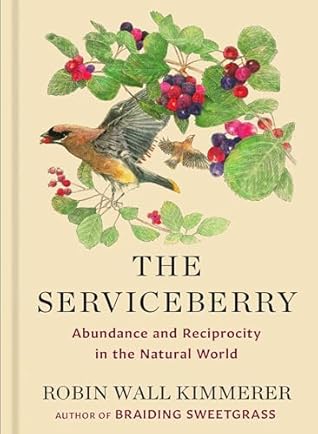More on this book
Community
Kindle Notes & Highlights
Read between
June 21 - June 24, 2025
Instead of changing the land to suit their convenience, they changed themselves. Eating with the seasons is a way of honoring abundance, by going to meet it when and where it arrives.
I can almost feel my mitochondria doing a happy dance when I eat them.
James Vukelich, an Anishinaabe linguist, teaches that these plant gifts are “a manifestation of unconditional love that plants have for people.” Plants offer whatever they have, to whoever needs it, “saint and sinner, alike,” he writes.
When we speak of these not as things or natural resources or commodities, but as gifts, our whole relationship to the natural world changes.
Food in our mouths is the thread that connects us in a relationship simultaneously spiritual and physical, as our bodies get fed and our spirits nourished by a sense of belonging, which is the most vital of foods.
Enumerating the gifts you’ve received creates a sense of abundance, the knowing that you already have what you need. Recognizing “enoughness” is a radical act in an economy that is always urging us to consume more.
If our first response to the receipt of gifts is gratitude, then our second is reciprocity: to give a gift in return.
Abundance is fueled by constantly circulating materials, not wasting them.
If the Sun is the source of flow in the economy of nature, what is the “Sun” of a human gift economy, the source that constantly replenishes the flow of gifts? Maybe it is love.
Conceiving of something as a gift changes your relationship to it in a profound way, even though the physical makeup of the “thing” has not changed.
And yet I am harnessed to this economy, in ways large and small, yoked to pervasive extraction. I’m wondering how we fix that. And I’m not alone.
The words “ecology” and “economy” come from the same root, the Greek oikos, meaning “home” or “household”: i.e., the systems of relationship, the goods and services that keep us alive.
When the natural world is understood as a gift instead of private property, there are ethical constraints on the accumulation of abundance that is not yours to own.
Gifts are not meant to be hoarded, and thus made scarce for others, but given away, which generates sufficiency for all.
Both have the result of keeping hunger at bay but with very different consequences for the people and for the land which provided that sustenance.
Why does everything have to be expanded?
What would it be like to consume with the full awareness that we are the recipients of earthly gifts, which we have not earned? To consume with humility? We are called to harvest honorably, with restraint, respect, reverence, and reciprocity.
Even when something is paid for as a commodity, the gift of relationship is still attached to it.
What if our metrics for well-being included birdsong, the crescendo of Crickets on a summer evening, and neighbors calling to each other across the road?


